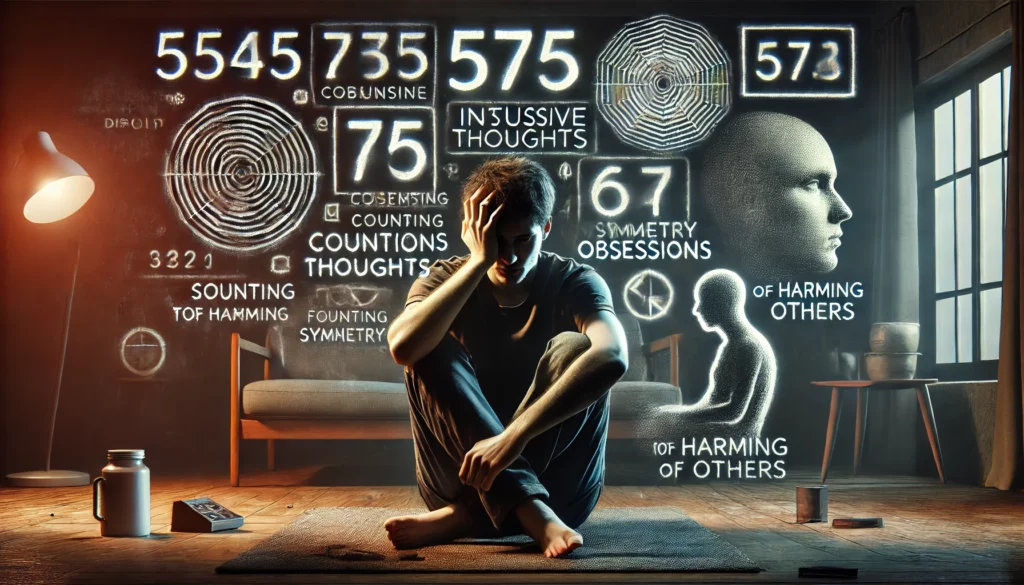
In the bipolar and unipolar spectrum, various compulsions can arise, often linked to Obsessive-Compulsive Disorder (OCD) or obsessive thought patterns. Compulsions can be divided into two main categories:
1️⃣ Obsessive Thoughts (Obsession) – Intrusive, unwanted thoughts or mental images.
2️⃣ Compulsive Actions (Compulsions) – Repetitive actions or rituals performed to alleviate anxiety.
1️⃣ Obsessive Thoughts in Bipolar & Unipolar Disorders
These unwanted thoughts are often intrusive, distressing, and trigger strong anxiety or discomfort.
🧠 Common Obsessive Thoughts:
🔹 Harm-related Obsessions – Fear of harming others (emotionally or physically).
🔹 Sexual Obsessive Thoughts – Fear of inappropriate or forbidden sexual fantasies.
🔹 Religious Obsessions (Scrupulosity) – Fear of violating moral or religious rules.
🔹 Symmetry & Order Obsessions – Distress when things are not “perfect” or “aligned.”
🔹 Contamination Obsessions – Fear of germs, dirt, or diseases.
🔹 Fear of Losing Control – Worry about acting impulsively in a harmful way.
Obsessive Thoughts in Bipolar Disorder
🔄 During Mania/Hypomania:
- Extreme thought loops, analyzing a single topic endlessly.
- Fear of saying or doing something inappropriate or uncontrollable.
- Obsessive ideas that everything has a deeper meaning (e.g., numerical obsessions).
😞 During the Depressive Phase:
- Constant guilt (“Am I a bad person?”).
- Catastrophic thoughts about the future or illness.
- Self-deprecating thought patterns (“I will fail,” “I am worthless”).
2️⃣ Compulsive Behaviors in Bipolar & Unipolar Disorders
Compulsive behaviors are ritualized actions that individuals perform to reduce anxiety.
🔄 Common Compulsive Behaviors:
✅ Checking Compulsion – Repeatedly verifying (Is the stove off? Is the door locked?).
✅ Washing & Cleaning Compulsion – Excessive handwashing or sanitizing.
✅ Counting Compulsion – Repetitive counting of objects, either mentally or aloud.
✅ Symmetry Compulsion – Perfectly arranging objects or creating balance.
✅ Ritualized Repetitions – Repeating certain words or actions for “safety.”
✅ Mental Rituals – Prayers or “magical thinking” to prevent disasters.
3️⃣ Differences: Compulsions in Bipolar & Unipolar Disorders
🔹 In Bipolar Disorder:
- Compulsive behaviors can be more impulsive in manic phases.
- Extreme rumination & racing thoughts.
- Hyperfixation on ideas (“It must be perfect!”).
🔹 In Unipolar Disorder (Depression):
- Ritualized compulsions to reduce anxiety.
- Perfectionism & excessive self-criticism.
- Less impulsivity, instead, long-lasting distressing thoughts.
4️⃣ Treatment of Compulsions in Bipolar & Unipolar Disorders
The good news: Compulsions are treatable! ✅
🔹 Cognitive Behavioral Therapy (CBT) – Identifying & retraining obsessive thought patterns.
🔹 Exposure and Response Prevention Therapy (ERP) – Facing fears without performing compulsive actions.
🔹 Medication (SSRIs, Mood Stabilizers) – Can help when compulsions are severe.
🔹 Mindfulness & Acceptance (ACT, Meditation) – Learning to observe thoughts without reacting to them.
➡ Conclusion:
Compulsions are a common symptom in both bipolar and unipolar disorders. They can significantly impact daily life but are highly treatable with therapy and proper strategies. 🎯💡